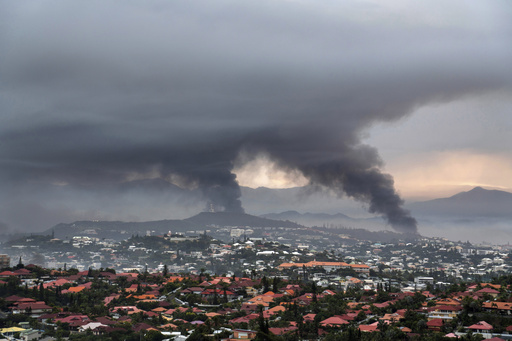PARIS (AP) — French President Emmanuel Macron decided on Monday to lift the state of emergency in the French Pacific territory of New Caledonia in a move meant to allow political dialogue following the unrest that left seven people dead and a trail of destruction, his office said.
The president’s office said in a statement that the state of emergency won’t be extended “for the moment” and will therefore end Monday at 8 p.m. in Paris, which is 5 a.m. Tuesday in New Caledonia.
The decision aims at “enabling meetings of the various components” of pro-independence movement FLNKS, the Kanak and Socialist National Liberation Front, and allowing elected officials and other local leaders “in a position to call” for lifting the barricades to go there and meet with protesters, the statement said.
New Caledonia’s top French official, High Commissioner Louis Le Franc said on Monday that an evening and overnight curfew will remain in place. Travel will be banned between 6 p.m. and 6 a.m. local time except for civil servants, medical professionals and other essential workers on night shifts and health emergencies.
New Caledonia’s ban on public gatherings, transport and carrying of weapons and sale of alcohol will also remain in place, Le Franc said.
The main international airport, La Tontouta, will remain closed to commercial traffic until Sunday, June 2, according to a statement from the archipelago’s Chamber of Commerce and Industry. The Tontouta airport shut down the day after protests against Macron government’s efforts to amend the French Constitution and change voting lists in New Caledonia turned violent.
The Magenta regional airport, located just outside the capital Nouméa, has been operational in the past few days as the hub for military flights chartered by France, Australia and New Zealand to evacuate French people and foreign tourists stuck on the unrest-hit archipelago.
Macron repeatedly pushed for the removal of protesters’ barricades with leaders on both sides of New Caledonia’s bitter divide — Indigenous Kanaks, who want independence, and the pro-Paris leaders, who do not.
In the statement, Macron insisted it is “the necessary condition for the opening of concrete and serious negotiations.”
The statement said 480 additional gendarmes are to arrive on the archipelago “in the next few hours,” putting security reinforcements at more than 3,500.
Macron’s move comes after he travelled Thursday to New Caledonia.
The seven people killed in shootings included at least three from the Indigenous Kanak community and two gendarmes. One of the gendarmes was killed when a weapon discharged accidentally, French Interior Ministry said.
The high commissioner, Le Franc, said more than 122 police officers and gendarmes have been injured in the unrest and more than 460 people have been arrested since the protests turned violent on May 14. Le Franc did not give the number of injured civilians.
The state of emergency had been imposed by Paris on May 15 for at least 12 days to boost police powers. The emergency measures give authorities greater powers to tackle the unrest, including the possibility of house detention for people deemed a threat to public order and expanded powers to conduct searches, seize weapons and restrict movements.
The leader of a pro-independence party in New Caledonia on Saturday called on supporters to “remain mobilized” across the French Pacific archipelago and “maintain resistance” against the Paris government’s efforts to impose electoral reforms that the Indigenous Kanak people fear would further marginalize them.
Christian Tein, the leader of the pro-independence party known as The Field Action Coordination Unit, addressed supporters and protesters in a video message posted on social media.
In a separate statement, the Kanak and Socialist National Liberation Front called on Macron to withdraw the electoral reform bill if France wants to “end the crisis.”
New Caledonia became French in 1853 under Emperor Napoleon III, Napoleon’s nephew and heir. It became an overseas territory after World War II, with French citizenship granted to all Kanaks in 1957.
————
Barbara Surk reported from Nice, France.
This website uses cookies so that we can provide you with the best user experience possible. Cookie information is stored in your browser and performs functions such as recognising you when you return to our website and helping our team to understand which sections of the website you find most interesting and useful.
